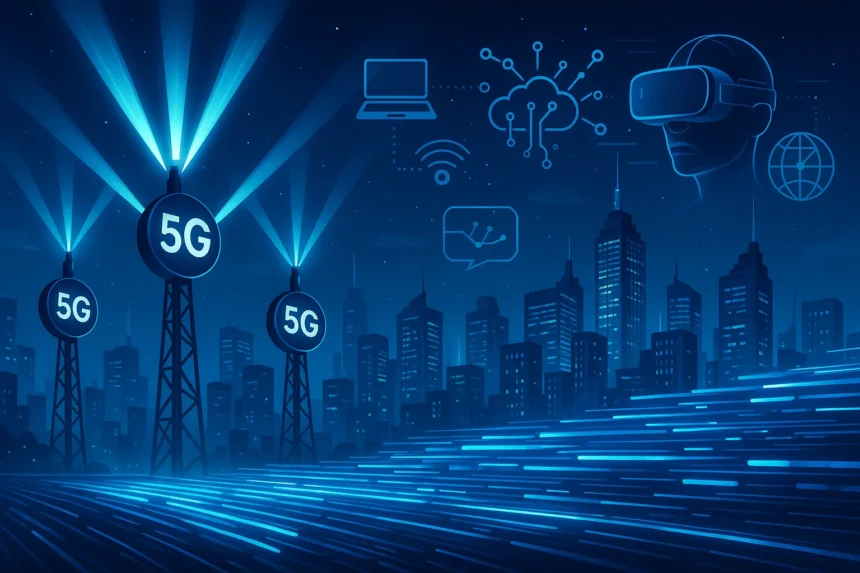As 5G networks continue to roll out globally, there is an ongoing debate about how they compare to 4G, particularly in terms of data usage. A common question among users is, “Does 5G use more data than 4G?” With the promise of faster speeds and more reliable connections, it’s natural to wonder if 5G will impact your data consumption, and if so, how much more data you might be using.
In this article, we’ll explore everything you need to know about 5G data usage, how it compares to 4G, and what this means for consumers. We’ll break down key concepts, share expert insights, and provide stats to help you better understand the implications of 5G on your mobile data plan.
The Evolution of Mobile Networks: From 4G to 5G
Before diving into the specifics of data consumption, let’s quickly review the differences between 4G and 5G technologies.
4G: The Foundation of Today’s Mobile Internet
4G networks, which have been the standard for mobile communication since approximately 2009, offer high-speed internet and support bandwidth-intensive activities such as HD video streaming, gaming, and social media use. It delivers speeds of up to 1 Gbps in ideal conditions.
4G networks were revolutionary for providing fast internet on the go. However, as data demands grew, 4G began to show its limitations, particularly in supporting more connected devices, ultra-low latency applications, and the expanding Internet of Things (IoT).
5G: The Next Frontier of Connectivity
5G, which began rolling out globally in 2019, is designed to meet the growing demands of today’s digital world. With speeds that can exceed 10 Gbps, 5G offers much faster data transfer rates, reduced latency (faster response times), and the ability to support a significantly higher number of connected devices simultaneously. These advancements make 5G particularly well-suited for applications such as autonomous vehicles, smart cities, and immersive AR/VR experiences.
Now, the burning question remains: Does 5G use more data than 4G?
Does 5G Use More Data? Here’s the Breakdown
Data Usage in General: The Key Difference
To answer whether 5G uses more data than 4G, it’s essential to understand how these networks function. 5G is faster than 4G, and this higher speed naturally leads to more data usage in certain circumstances. Here’s why:
- Faster Speeds: 5G speeds are up to 100 times faster than 4G, meaning that activities like streaming, downloading, and uploading data happen much quicker. The faster the speed, the more data you’ll consume if you’re engaging in data-intensive activities.
- Higher Quality Content: With 5 G’s ability to stream ultra-high-definition (UHD) and 4K content with ease, users are likely to consume more data when watching videos. For example, a 4K video on 5G may use far more data than a standard 1080p video on 4 G.
- Increased Device Connectivity: 5G enables the simultaneous connection of more devices, allowing for greater data consumption across smart homes, IoT devices, and connected gadgets.
The Role of Data-Intensive Applications
As 5G enables faster speeds, applications that require high data usage (like video streaming, online gaming, virtual reality, and cloud-based applications) will naturally consume more data. Here’s a closer look at these applications:
- Video Streaming: On a 5G network, users can stream 4K and even 8K video content, which uses significantly more data than regular HD streaming. For instance, streaming 4K content on Netflix consumes approximately 7GB per hour.
- Gaming: The speed and low latency of 5G can make gaming more immersive and data-heavy. Games that require constant updates, real-time multiplayer modes, or cloud-based gaming (such as Google Stadia or Xbox Cloud Gaming) can use more data, especially with 5 G’s enhanced speeds.
- Virtual and Augmented Reality: VR and AR applications, which rely on high data throughput for smooth user experiences, will consume far more data on 5G than they would on 4 G.
Expert Views on 5G and Data Consumption
To better understand the data usage impact of 5G, let’s look at what some experts have to say.
Dr. Mark Smith, 5G Expert
Dr. Mark Smith, a telecommunications expert and professor at MIT, offers this insight:
“5G will undoubtedly lead to higher data usage due to its speed and low latency. However, it’s not just about using more data; it’s about enabling new, high-demand applications that require this data. For example, autonomous vehicles will require constant, high-bandwidth data communication, which wouldn’t have been possible on 4G networks.”
Emily Johnson, Mobile Data Analyst at Statista
Emily Johnson from Statista shares her perspective:
“While 5G offers blazing-fast speeds, it also opens the door to higher-quality content. As users start consuming more 4K and 8K video, cloud gaming, and VR, data consumption is expected to rise. In fact, we’ve seen a 30-40% increase in mobile data usage from 4G to 5G networks, with users engaging more in data-heavy activities.”
Real-World Case Study: 5G Data Usage in Action
Let’s take a look at Verizon’s 5G rollout and its impact on consumer data usage.
Verizon’s 5G Launch: A Data Surge
When Verizon launched its 5G Ultra Wideband network in select U.S. cities, it saw a noticeable increase in data usage. According to a report by Verizon, 5G users were consuming up to 50% more data than their 4G counterparts, primarily due to the ability to stream ultra-high-definition videos and play cloud-based games.
Additionally, Verizon’s 5G users were more likely to download and upload large files, utilize high-speed cloud services, and employ data-intensive apps. As Verizon continues to expand its 5G coverage, this trend in data consumption is expected to grow.
Data Plans and Cost Implications
While 5G may use more data, the impact on your mobile plan depends on the plan you have. Here’s what you need to know:
1. Higher Data Caps or Unlimited Plans:
Given the increased data consumption on 5G, mobile carriers may offer higher data caps or unlimited data plans for 5G users. These plans might seem tempting, but they can come with higher costs.
2. Data Throttling:
Some carriers may throttle your data speed once you reach a certain threshold. As 5G networks become more mainstream, keep an eye on how your carrier adjusts its data policies to accommodate the increased usage.
3. 5G-Specific Plans:
Carriers like AT&T, T-Mobile, and Verizon have introduced 5 G-specific plans that offer users more data or higher-speed limits, ensuring that consumers aren’t caught off guard by unexpected data consumption.
Does 5G Use More Data Than 4G for Everyday Activities?
While 5G can utilize more data for specific activities, such as video streaming and gaming, day-to-day activities like web browsing, social media usage, or email checking may not experience a significant increase in data consumption compared to 4 G. The higher speeds of 5G may not always translate into more data usage unless you’re engaging in content-heavy or bandwidth-intensive tasks.
Typical Data Usage:
- 4G: Streaming HD videos on platforms like YouTube can use 3GB per hour.
- 5G: Streaming 4K videos on the same platform may consume nearly 7GB per hour, nearly double the data usage.
Conclusion: Does 5G Use More Data?
Yes, 5G does use more data than 4G, primarily due to its faster speeds and increased capability for high-quality content consumption, real-time gaming, and immersive applications like virtual reality (VR). While 5G offers unparalleled speed and potential, it also means that data-heavy activities will consume significantly more data.
However, for users who do not frequently engage in such activities, the increase in data usage may not be noticeable in day-to-day tasks. If you often stream 4K content, play cloud-based games, or use data-heavy apps, 5G will likely lead to a noticeable increase in your data usage.
Ultimately, whether or not 5G is worth the extra data depends on how you use your mobile network. As 5G networks continue to expand and data plans evolve, it’s essential to stay informed and choose a data plan that suits your new data needs.
Also Read: Social Media Marketing Tips for Small Businesses 2025






